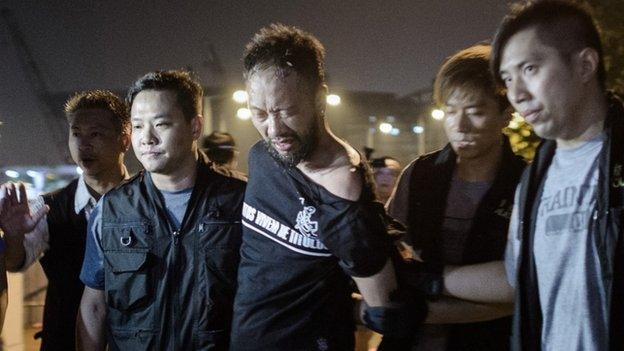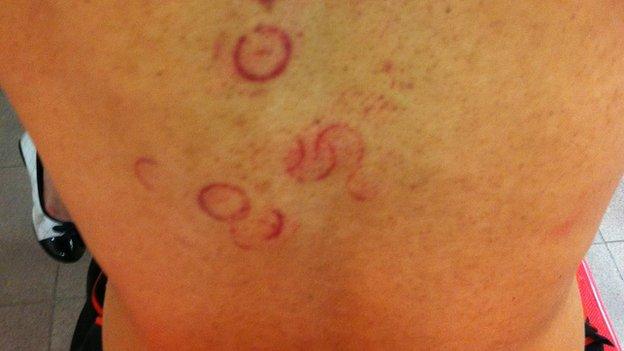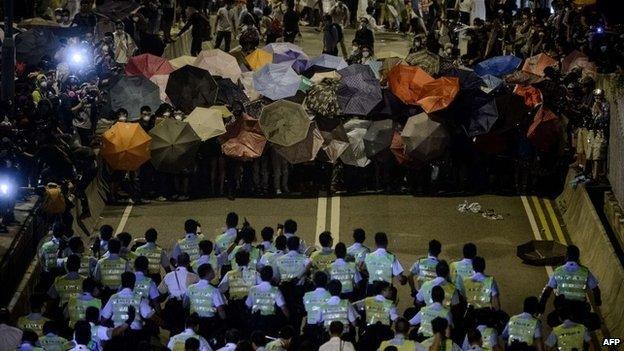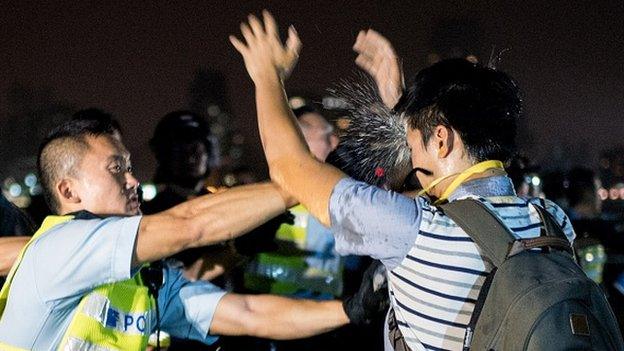HK police to investigate 'beating'
- Published
People have been shocked by video apparently showing police brutality, reports Juliana Liu from Hong Kong
The Hong Kong police department is investigating reports that officers used excessive force against pro-democracy protesters.
Local TV showed images of officers beating a handcuffed protester on Wednesday in some of the worst clashes since the street demonstrations began.
The protester's lawyer told the BBC his client had suffered serious injuries.
Hong Kong's security chief said the officers had been "temporarily removed from their current duties".
The incident occurred as police cleared an underpass near government buildings.
In a separate development, the BBC's English-language news website has been blocked in mainland China.
It was unclear whether the blackout was connected with the Hong Kong situation.
'Aggressive manner'
The police advance came when protesters blockaded the underpass after being cleared out of other areas of the city late on Tuesday.

Ken Tsang, a social worker and member of the Civic Party, was taken away by plainclothes policemen

Ken Tsang's lawyer says the beatings continued while the protester was in police custody
Overnight, police used pepper spray and batons to remove protesters from Lung Wo Road, which they said had to be cleared as it was a major thoroughfare.
They also arrested 45 people for "unlawful assembly" and "obstructing police officers in the execution of duties".
Local TV network TVB aired footage showing a group of plainclothes policeman dragging a handcuffed and unarmed protester and placing him on the ground.
They then assault him, kicking and beating him for minutes.
The man was named as Ken Tsang, a social worker and member of the opposition Civic Party. He was later taken to hospital.
Mr Tsang's lawyer, Dennis Kwok, told the BBC the protester had serious injuries and the beatings had continued while he was in custody.
"My understanding from Ken Tsang is that when he was taken away by the police officer they have already immediately put plastic strip across his arms to cuff him basically," the lawyer said.
"But after they took him to that corner... they punched him, they pushed him down on the floor and they repeatedly kicked him for about four minutes.
"And then - when he was taken to the police station - he was abused again by the police officers present."
Secretary for Security Lai Tung-kwok said there was "concern" over a video clip "showing police officers who used inappropriate force against an arrested person".
He said the officers seen on the video would be removed from their current duties and an investigation would be carried out.

Analysis: Juliana Liu, BBC News, Hong Kong
The footage shot by broadcaster TVB has been widely shared on social media.
Accusations of police using excessive force were made when authorities fired tear gas as the protests first erupted in late September. But this incident, which took place at around 03:00 on Wednesday (19:00 GMT Tuesday), was different. Ken Tsang had already been detained and no longer posed any threat to law enforcement.
Hong Kong's police force has for years prided itself on its professionalism, political neutrality and experience with crowd control. Now, citizens are asking, why did officers appear to behave with impunity toward a protester who had been subdued?

Police spokesman Hui Chun-tak later said the officers "repeatedly gave advice and warnings" before the operation began.
He said the officers had to act after the protesters "advanced forward in an aggressive manner, kicked our officers".

In all, 37 men and eight women were arrested, Mr Hui added. Five police officers were injured.
The protesters are now in their third week of occupying key parts of the city in a bid to put pressure on China and Hong Kong's authorities to answer their calls for political reform.
Thousands of people took to the streets at the beginning of the demonstrations but the numbers have dwindled in recent days.
They are demanding fully free elections in a vote for the territory's leader in 2017. China, which has control over Hong Kong, says residents can vote - but it will vet which candidates are eligible to stand.
Occupy Central and the Hong Kong Federation of Students, the two main groups behind the protests, have condemned the violence and asked authorities to investigate.

Police marched towards protesters blocking the road while holding umbrellas - a symbol of their cause

Police said in a statement that complaints of excessive use of force by officers would be investigated
Student spokeswoman Yvonne Leung: "The police tactics will only prolong the protests"
On Wednesday, China's People's Daily, the Communist Party's official newspaper, said the protests were "doomed to fail" in a front-page editorial.

Hong Kong democracy timeline
1997: UK gives Hong Kong back to China under a 1984 agreement giving it "a high degree of autonomy" for 50 years
2004: China says it must approve any changes to Hong Kong's election laws
June-July 2014: Pro-democracy activists hold an unofficial referendum on political reform; both sides hold large rallies
31 August 2014: China says it will allow direct elections in 2017 but will pre-approve candidates
22 September 2014: Student groups launch a week-long boycott of classes
28 September 2014: Occupy Central and student protests join forces and take over central Hong Kong
2017: Direct elections for chief executive due to take place
